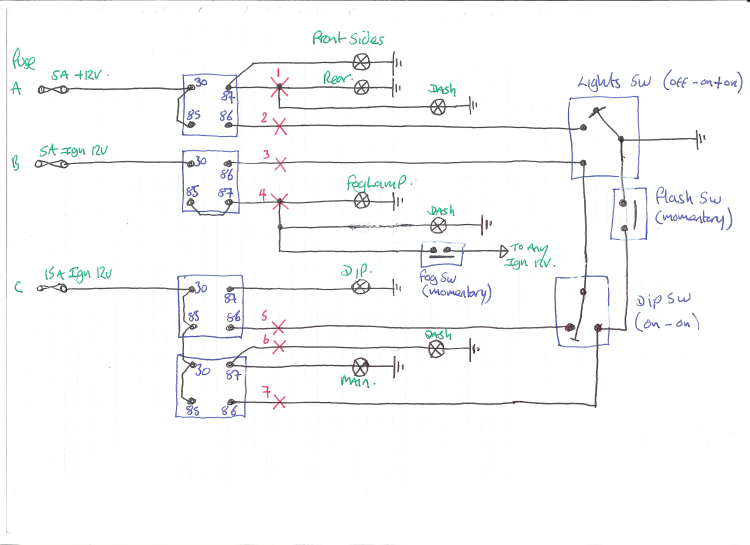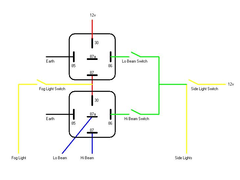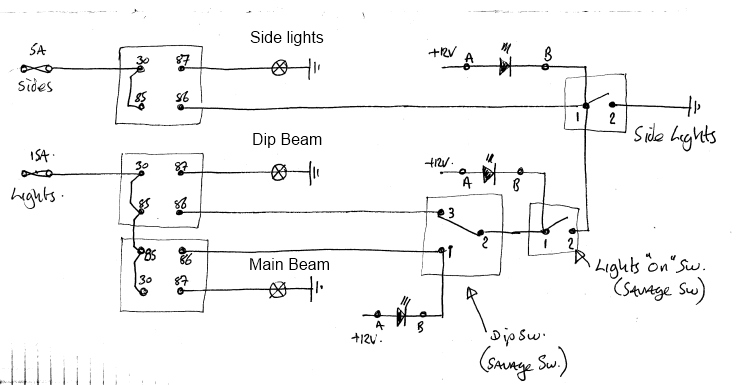marco
|
| posted on 26/6/14 at 02:50 PM |

|
|
Wiring circuit advice checking please
Could those with a little more experience than me cast an eye on these three circuits for me please and advise if there are any potential issues.
They are quick garage scribbles mind  The engine is a GSXR 1000 The engine is a GSXR 1000
 
 
 
|
|
|
|
|
gremlin1234
|
| posted on 26/6/14 at 06:34 PM |

|
|
the first one appears to allow beam headlights without sidelights, (and rear lights ! )
which I think would fail iva
not sure why you want two relays in the reverse either.
|
|
|
gremlin1234
|
| posted on 26/6/14 at 06:43 PM |

|
|
quote:
not sure why you want two relays in the reverse either.
ah, I see its to do 'neutral' interlock, - in that case the in
neutral switch just has to be to ground when out of gear, - it doesn't need to go to 12v in gear.
|
|
|
snowy2
|
| posted on 26/6/14 at 08:40 PM |

|
|
The first relay diagram seems to allow main beam to work but as far as i can work out dip will never work as the relay isnt earthed for switching or
connected in such a way that there will be a difference in voltage t activate it. it will allow main beam to be on irrespective of the side lights or
not.
the second ....you dont need two relays to do the reversing motor....the second relay does the job that the first does.......the relay wont activate
until the engine is neutral and the momentary switch is pressed, it then just switches on the second relay which is totally superfluous. The hazard
switch from a ordinary dpdt switch is much easier to wire up and you dont need diodes..
switch 1 2
3 4
5 6
from the terminals......connect 1 to left hand indicator switch output, 2 to right hand indicator switch output.
3 to left indicator bulbs, 4 to right indicator bulbs, join 5 + 6 together and connect to the Hazard relay output.
[Edited on 26/6/14 by snowy2]
sometimes you are the pigeon, most of the time the statue.
|
|
|
marco
|
| posted on 26/6/14 at 10:08 PM |

|
|
quote:
Originally posted by gremlin1234
quote:
not sure why you want two relays in the reverse either.
ah, I see its to do 'neutral' interlock, - in that case the in
neutral switch just has to be to ground when out of gear, - it doesn't need to go to 12v in gear.
Not sure what you mean can you show via a diagram or via the relay numbers?
|
|
|
marco
|
| posted on 26/6/14 at 10:38 PM |

|
|
quote:
Originally posted by snowy2
The first relay diagram seems to allow main beam to work but as far as i can work out dip will never work as the relay isnt earthed for switching or
connected in such a way that there will be a difference in voltage t activate it. it will allow main beam to be on irrespective of the side lights or
not.
the second ....you dont need two relays to do the reversing motor....the second relay does the job that the first does.......the relay wont activate
until the engine is neutral and the momentary switch is pressed, it then just switches on the second relay which is totally superfluous. The hazard
switch from a ordinary dpdt switch is much easier to wire up and you dont need diodes..
switch 1 2
3 4
5 6
from the terminals......connect 1 to left hand indicator switch output, 2 to right hand indicator switch output.
3 to left indicator bulbs, 4 to right indicator bulbs, join 5 + 6 together and connect to the Hazard relay output.
[Edited on 26/6/14 by snowy2]
Iva requirements don't apply as this is a complete re-wire of a car a few years old now.
The three circuits all work(tested) as they are shown currently, when main beam is switched dipped goes off as 12v is then at either side of the coil
on the main beam relay which kills main beam.
Dipped beam works as is because pin 86 is ground until main beam is active. It only works when sidelights are on because of the shared supply from the
fuse box
Yes main beam can be on irrespective of side and main lights been on, which I thought i could use for headlight flashing purposes which doesn't
have any rear lights on. (main beam is a latching savage switch)
What I'm not sure of with relays is the coil side, does it allow current through it directly so I would have some current through the main beam
feed when i have dipped beam switched on ?
The hazards are only using one side of my savage switch because I'm wanting to use the other switching side for dim lighting of the led's
when the side lights are switched on at night. This is why the diodes have to be there too.
I understand both comments on the reverse circuit and looking at the diagram I can see exactly what you mean and agree, I need to double check it
again as we did try with only one relay and it failed to work for some reason.
I've searched high and low for a simple lighting diagram for switching dipped off when main is on without a dip switch and only using savage
switches and relays.
|
|
|
snowy2
|
| posted on 27/6/14 at 04:27 AM |

|
|
When I get home tonight I will post my diagrams which use ordinary toggle switches (or any other).....
sometimes you are the pigeon, most of the time the statue.
|
|
|
marco
|
| posted on 27/6/14 at 10:02 AM |

|
|
quote:
Originally posted by snowy2
When I get home tonight I will post my diagrams which use ordinary toggle switches (or any other).....
Great thanks
|
|
|
snowy2
|
| posted on 27/6/14 at 06:21 PM |

|
|

explanation,
the switches can be of any type, i like chrome toggle switches, but standard car switches can be used. the circuit is earth switched ....so the dash
area has almost no current flowing and any short will only activate the circuit.
the fog lights will only come on if the ignition is ON and if the lights are on (not just sides) the fogs are connected via a latching relay and a
momentary switch, they will automatically go off if the lights OR the ignition is turned off (as per IVA requirement)
The red "X's" show where the wires connect under the dash and are for my system of wiring a car. you can ignore them.
light switch needs to be Off, on(1) and on (1+2) the dip switch is just a standard spdt switch with 3 terminals, the flash switch is a momentary
switch.
sometimes you are the pigeon, most of the time the statue.
|
|
|
marco
|
| posted on 27/6/14 at 06:54 PM |

|
|
I don't think this is going to solve mine as I have no off on on switch, savage switches only latch or a dip switch ? I don't want to use
toggles now I've invested in these and cut my dash 
I have the following, all latching savage switches,
Side light switch
dipped switch
main beam switch
fog switch
|
|
|
snowy2
|
| posted on 27/6/14 at 07:31 PM |

|
|
post the switch pin out and i will see what i can work out.......i assume the switches come with basic wiring and descriptions......
sometimes you are the pigeon, most of the time the statue.
|
|
|
marco
|
| posted on 27/6/14 at 07:43 PM |

|
|
quote:
Originally posted by snowy2
post the switch pin out and i will see what i can work out.......i assume the switches come with basic wiring and descriptions......
Here we go,
I need to use one side of the switch pins for my side light led dim idea, the led's in these are very bright so when i switch the sidelights on
I will use a resistor to reduce the +v to the led pin, when sidelights are off it will take the full 12v+ from the switched side positive so in
daylight when pushed in the led will be at full and when not in use will be off.
 
[Edited on 27/6/14 by marco]
|
|
|
Smoking Frog
|
| posted on 27/6/14 at 10:44 PM |

|
|
This may help with the lighting, bare in mind it's untested. There is no courtesy hi beam flash but as you have separate switches for each
function it's not practical, unless another relay and momentary switch was fitted. Green and black wires can be quite light as they only power
the relay coils.
 
Description
|
|
|
ste
|
| posted on 28/6/14 at 05:13 AM |

|
|
Some info here, but will assume you have a dip/ main switch on the column
http://www.polevolt.co.uk/acatalog/Side%20and%20Headlights.pdf
|
|
|
snowy2
|
| posted on 28/6/14 at 06:38 AM |

|
|
quote:
Originally posted by marco
quote:
Originally posted by snowy2
post the switch pin out and i will see what i can work out.......i assume the switches come with basic wiring and descriptions......
Here we go,
I need to use one side of the switch pins for my side light led dim idea, the led's in these are very bright so when i switch the sidelights on
I will use a resistor to reduce the +v to the led pin, when sidelights are off it will take the full 12v+ from the switched side positive so in
daylight when pushed in the led will be at full and when not in use will be off.
 
[Edited on 27/6/14 by marco]
Those switches are just normal on-on switches(spdt) and could be incorporated into the circuit i show above, they would have to be wired slightly
different to the way suggested by the manufacturer. i will do a drawing to show you a bit later today.
sometimes you are the pigeon, most of the time the statue.
|
|
|
snowy2
|
| posted on 28/6/14 at 06:42 AM |

|
|
quote:
Originally posted by Smoking Frog
This may help with the lighting, bare in mind it's untested. There is no courtesy hi beam flash but as you have separate switches for each
function it's not practical, unless another relay and momentary switch was fitted. Green and black wires can be quite light as they only power
the relay coils.
 
Description
neat.....but.....
your circuit assumes that the dip will stay on when the main beam is activated as the power to the second relay is dependant on the first being
powered up once you switch over to main beam the relay powers down and there is no power for the second relay.
sometimes you are the pigeon, most of the time the statue.
|
|
|
Smoking Frog
|
| posted on 28/6/14 at 10:23 AM |

|
|
quote:
neat.....but.....
your circuit assumes that the dip will stay on when the main beam is activated as the power to the second relay is dependant on the first being
powered up once you switch over to main beam the relay powers down and there is no power for the second relay.
Yes, lo beam switch must be in the on position for the hi beam to work, although neither light will be on at the same time. With separate switches I
think this would be a good thing. Imagine dark country lane lights on hi beam and having to dip lights for oncoming traffic it would be good to have
the lights revert back to lo beam without having to press another button.
|
|
|
snowy2
|
| posted on 28/6/14 at 02:53 PM |

|
|

this should work with your savage switches.......the numbers on the switches corresponds to the diagram you gave earlier, the led's need a
separate +12V supply and to be connected as shown. i have not included flash or fogs as i dont know if your savage switches also have a momentary
option.
you should get the leds to illuminate as the switches are operated the main beam/dip sw i assume glows blue when "ON"
But to add a flash switch just connect terminal 1 on the dip switch to terminal 2 on the side lights switch with a momentary switch between, the main
beam should flash.
[Edited on 28/6/14 by snowy2]
sometimes you are the pigeon, most of the time the statue.
|
|
|
marco
|
| posted on 28/6/14 at 03:03 PM |

|
|
quote:
Originally posted by snowy2

this should work with your savage switches.......the numbers on the switches corresponds to the diagram you gave earlier, the led's need a
separate +12V supply and to be connected as shown. i have not included flash or fogs as i dont know if your savage switches also have a momentary
option.
you should get the leds to illuminate as the switches are operated the main beam/dip sw i assume glows blue when "ON"
Perfect thanks Snowy  very much appreciated.. very much appreciated..
I was nearly there with the same thought process of running the supply (switching side) through the last switch (main ) so it controls switching off
dipped and on main and vice versa just not had 5 minutes to sit down and think about it..
|
|
|
snowy2
|
| posted on 28/6/14 at 04:09 PM |

|
|
No problems.....glad to help.
one thing.....you could leave the lights "ON" switch on and turn the whole lot off by just switching the sides off....
P.S. the sides need to be battery live, the other lights ideally want to be ignition switched......
sometimes you are the pigeon, most of the time the statue.
|
|
|













